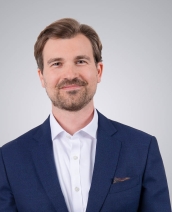Dr. Philipp Seidel
Principal
Philipp advises clients in the automotive industry on product and market strategies, sales and after-sales optimization, and new business models for emerging mobility services.

Education
Past Experience

Philipp is a Principal at Arthur D. Little’s Munich office. His work focus and expertise are around product, technology and downstream strategies for automotive clients.
A major part of his consulting work has been dedicated to supporting automotive OEMs and suppliers in meeting fleet CO2 targets and growing e-mobility with technology studies, market insight, and the development and implementation of new-product, sales and service strategies. Recently, the identification of innovative business models with mobility services for OEM and new market entrants has become an additional focus area. Philipp has also advised various manufacturers on successfully developing businesses with racetrack, vintage and highly individualized vehicles.
His recent consulting experience includes assignments in Germany and all of Central Europe, the UK, the US and Canada, China, Malaysia and Singapore.
Before joining Arthur D. Little, Philipp worked in the automotive industry (Audi AG), management consulting (Ricardo Strategic Consulting) and science (Catholic University of Eichstaett-Ingolstadt).
Philipp holds a Diploma and a doctoral degree in Business Administration from Catholic University of Eichstaett-Ingolstadt, and an LL.M. from the University of Muenster (both Germany). He is fluent in German and English.

Chinese electric vehicles: Drag or driver for global markets?

Opening the urban mine

Making the shift

Philipp is a Principal at Arthur D. Little’s Munich office. His work focus and expertise are around product, technology and downstream strategies for automotive clients.
A major part of his consulting work has been dedicated to supporting automotive OEMs and suppliers in meeting fleet CO2 targets and growing e-mobility with technology studies, market insight, and the development and implementation of new-product, sales and service strategies. Recently, the identification of innovative business models with mobility services for OEM and new market entrants has become an additional focus area. Philipp has also advised various manufacturers on successfully developing businesses with racetrack, vintage and highly individualized vehicles.
His recent consulting experience includes assignments in Germany and all of Central Europe, the UK, the US and Canada, China, Malaysia and Singapore.
Before joining Arthur D. Little, Philipp worked in the automotive industry (Audi AG), management consulting (Ricardo Strategic Consulting) and science (Catholic University of Eichstaett-Ingolstadt).
Philipp holds a Diploma and a doctoral degree in Business Administration from Catholic University of Eichstaett-Ingolstadt, and an LL.M. from the University of Muenster (both Germany). He is fluent in German and English.

Chinese electric vehicles: Drag or driver for global markets?

Opening the urban mine

Making the shift
More About Philipp
- Cath. University Eichstaett-IngolstadtDr. rer. pol., Diploma Business Administration
- University MuensterLL.M.
- Ricardo Strategic ConsultingSenior Manager
- CU Eichstaett-IngolstadtResearcher/Lecturer
